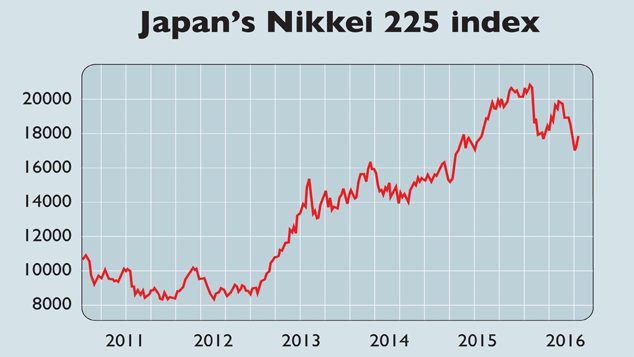Regime change in Japan
The Bank of Japan's decision to cu interest rates to below zero is a clear signal it will do anything to create inflation.

Get the latest financial news, insights and expert analysis from our award-winning MoneyWeek team, to help you understand what really matters when it comes to your finances.
You are now subscribed
Your newsletter sign-up was successful
Want to add more newsletters?

Twice daily
MoneyWeek
Get the latest financial news, insights and expert analysis from our award-winning MoneyWeek team, to help you understand what really matters when it comes to your finances.

Four times a week
Look After My Bills
Sign up to our free money-saving newsletter, filled with the latest news and expert advice to help you find the best tips and deals for managing your bills. Start saving today!

"If China wants a lesson in how to shock markets without upsetting them, it could look to its neighbour," says Lex in the FT. Japanese stocks bounced by around 3% as the Bank of Japan announced a reduction in interest rates from 0.1% to -0.1%, thus joining the European, Swiss, Danish and Swedish central banks in negative territory. Japanese banks will now have to pay the central bank 0.1% if they park cash with it.
Only a few weeks ago, the Bank of Japan governor, Haruhiko Kuroda, was adamant that he would not cut rates below zero.This "shock move" is Kuroda's attempt to "regain his credibility as a deflation fighter", says the FT's Robin Harding.
In the past few months, with China's slowdown rattling the markets, fears grew that Japanese inflation was looking less and less likely to reach the 2% target. That in turn could undermine investment and confidence, making the problem self-fulfilling. Last week the Bank was forced to downgrade its inflation forecast, so it was all the more important that it regain the initiative. Cue Kuroda's surprise move.
MoneyWeek
Subscribe to MoneyWeek today and get your first six magazine issues absolutely FREE

Sign up to Money Morning
Don't miss the latest investment and personal finances news, market analysis, plus money-saving tips with our free twice-daily newsletter
Don't miss the latest investment and personal finances news, market analysis, plus money-saving tips with our free twice-daily newsletter
Being charged to hold reserves with the central bank should in theory encourage banks to lend it out or invest it instead, spurring growth. But unlike in Europe,the negative rate will apply to new reserves, not existing ones, so there willbe scant immediate economic impact.
This is primarily a matter of psychology. "As a signal of intent, the move is powerful," says Adam Cole of RBC Capital Markets. The Bank now has a new tool to fight Japan's chronic deflation, having already inflated its balance sheet to 75% of Japan's GDP with its bond purchases through quantitative easing. "This is a very big regime change," says Masaaki Kanno of JPMorgan. It's a clear sign that it will do whatever it takes to create inflation.
Looser monetary policy is not the only reason to like Japanese stocks. Japan is on a cyclically adjusted price/earnings ratio of 25, below the median since 1969 of 38, says John Authers in the FT.
Most sectors of the wider market are cheaper than their average valuation since 2000, while firms are more profitable. Earnings have climbed to 3.5% of GDP, double their level of 20 years ago. Japanese firms are sitting on cash mountains, so dividends and share buybacks should rise. Japan also has "everything to gain from cheaper crude", says Authers. It remains a buy.
Get the latest financial news, insights and expert analysis from our award-winning MoneyWeek team, to help you understand what really matters when it comes to your finances.

-
 Should you buy an active ETF?
Should you buy an active ETF?ETFs are often mischaracterised as passive products, but they can be a convenient way to add active management to your portfolio
-
 Power up your pension before 5 April – easy ways to save before the tax year end
Power up your pension before 5 April – easy ways to save before the tax year endWith the end of the tax year looming, pension savers currently have a window to review and maximise what’s going into their retirement funds – we look at how